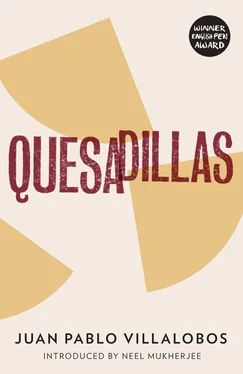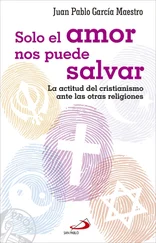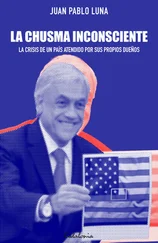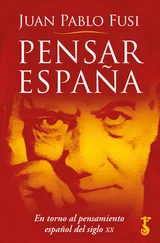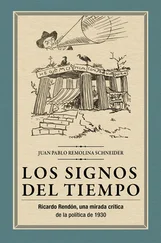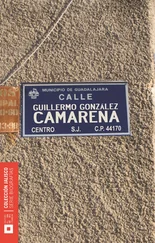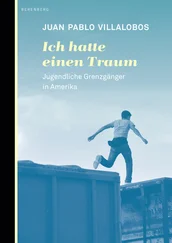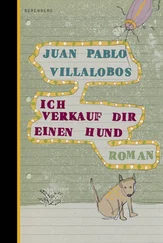Another big relief was finally to be able to ascribe a motive to my mother’s recurring weeping sessions. It was something she used to do before, especially over the washing-up, and whenever we had asked her what was wrong she’d always replied that it was nothing. What did she mean ‘nothing’? In that case why was she crying? We stopped asking her, took a break from our worrying, as now we knew she was crying for her missing children, for having bartered her place in the queue at the meat counter for the pretend twins.
Something similar happened with my father’s nervous exhaustion. Mercifully he now had a way to channel his insults, to translate national disaster into family disgrace, and condemn all politicians — regardless of rank or responsibility — for patently wallowing in their ineptitude at finding my little brothers. What he’d lost in professionalism and objectivity he had gained in poetic intensity. When Officer Mophead announced they were going to close the case, my father reached for a phrase that expressed perfectly the misfortunes of fate: ‘Life was just waiting to serve me up an arsehole like him.’
As if all these advantages weren’t enough, which I’m not ashamed to admit, my siblings and I had awoken to a new and most convenient reality: we now got more quesadillas apiece in the nightly allocation. An unhealthy age dawned in which the truly significant difference was that I started noticing some things in my life for the first time. Up until then, the excess of stimuli had taught me distraction, generalisation, the need to act extremely quickly when I had the chance, before someone beat me to it. I hadn’t had time to stop and notice details, analyse characteristics or personalities, because things were always happening: fights, shouts, complaints, accusations, games with incomprehensible rules (to make sure that Aristotle won); a glass of milk would be knocked over, someone would break a plate, someone else would bring a snake they’d caught out on the hillside into the house. Chaos imposed its law and provided tangible proof that the universe was expanding, slowly falling apart and blurring the edges of reality.
Now things were changing; we’d abandoned our status as an indiscriminate horde and moved from the category of multitudinous rabble to that of modest rabble. I only had four brothers and sisters left, and now I was able to look at them carefully, notice that two were very like my mother, that Aristotle had a pair of enormous ears that explained all his nicknames, that Archilochus and Callimachus were the same height despite being different ages; I even learned to tell us all apart by the stains on our teeth, assiduously imparted by the town’s fluoridated water. And, what’s more, we suddenly had a little sister who was making her damp debut aged seven by regressing to nightly bed-wetting.
I took advantage of things getting back to normal to start up my sociological research once again.
‘Is it possible to stop being poor, Mamá ?’
‘We’re not poor, Oreo, we’re middle class,’ replied my mother, as if one’s socio-economic status were a mental state.
But all this about being middle class was like the normal quesadillas, something that could only exist in a normal country, a country where people weren’t constantly trying to screw you over. Anything normal was damned hard to obtain. At school they specialised in organising mass exterminations of any remotely eccentric student so as to turn us into normal people. Indeed, all the teachers and the priests complained constantly: why the hell couldn’t we act like normal people? The problem was that if we’d paid attention, if we’d followed the interpretations of their teachings to the letter, we would have ended up doing the opposite, nothing but sheer bonkers bullshit. We did what we could, what our randy bodies demanded of us, and we always pretended to ask for forgiveness, because they made us go to confession on the first Friday of every month.
To avoid confessing the number of times I jerked off every day, I tried to distract the priest who heard my confession.
‘Father, forgive me for being poor.’
‘Being poor is not a sin, my child.’
‘Oh, really?’
‘No.’
‘But I don’t want to be poor, so I’ll probably end up stealing things or killing someone to stop being poor.’
‘One must be dignified in poverty, my child. One must learn to live in poverty with dignity. Jesus Christ our Lord was poor.’
‘Oh, and are you priests poor?’
‘Times have changed.’
‘So you’re not?’
‘We don’t concern ourselves with material questions. We take care of the spirit. Money doesn’t interest us.’
My father said the same thing when, in order to prove my mother was lying, I asked him if we were poor or middle class. He said that money didn’t matter, that what mattered was dignity. That confirmed it: we were poor. Our economic advances caused by the twins’ disappearance led me to start fantasising about slimming down the family still more so as to leave poverty behind altogether. How much better off would we be if another one of my siblings went missing? What would happen if two or three of them disappeared?
Would we be rich?
Or middle class, at least?
It all depended on the flexibility of the family economy.
‘I smell a rat,’ my father started to say from the moment the bulldozers arrived, swiftly followed by an army of builders. Every day the trucks went back and forth, bringing building materials or taking waste away.
My father mentally calculated the resources required to organise such a spectacle.
‘I smell a rat,’ he said again, because he could smell the petrol being burned by the machines, the cement being prepared by the mixers. It smelt of paint and soldering; it smelt of money, loads of money.
All in all, it took our neighbours six months to build their insult to our humble little house. Every night during this period, before going to sleep, we would visit the building site to carry out a critical evaluation of the architectural advances. Nothing but sheer, lousy envy. This mansion wasn’t ashamed of the existence of the hill — unlike our house, which purported to be poised ‘evenly’ thanks to an artificial terrace — quite the opposite: the architect had taken full advantage of the hill to lay out the rooms on different levels. It wasn’t that the house had two or three floors, but rather that it was built at different heights.
My mother maintained that the size of the kitchen was ludicrous, but she said it from her phoney middle-class perspective. Sure, why the hell would we want a gigantic kitchen — to hold quesadilla-throwing tournaments? After counting up the bedrooms and the bathrooms, my father had arrived at the conclusion that our neighbours would be a large family, a genuinely large one, with nine or ten children. This conclusion was nothing but an aspirational syllogism, because it implied it was possible to be rich in a large family, which would imply stratospheric quantities of cash. Here was another hole in this senseless story, also of interplanetary proportions, because the rich didn’t want to live on the Cerro de la Chingada; the rich lived in the centre. What was this enormous, luxurious house doing next to our little shoebox?
Our speculations spread like the flames from a lazy inferno, gradually taking over every corner of the house, firing up our daily conversations, until one day, halfway through the summer holidays, someone knocked at the door and there were our neighbours with their fireman’s hose. Right from the start we were faced with a very serious arithmetical problem, since no matter how hard we looked we could only see three people, who, according to our calculations, must be a father, a mother and one son. As he opened the door to say hello, my father stuck his head out and peered towards the infinite horizon to see if he could glimpse the rest of the family.
Читать дальше
